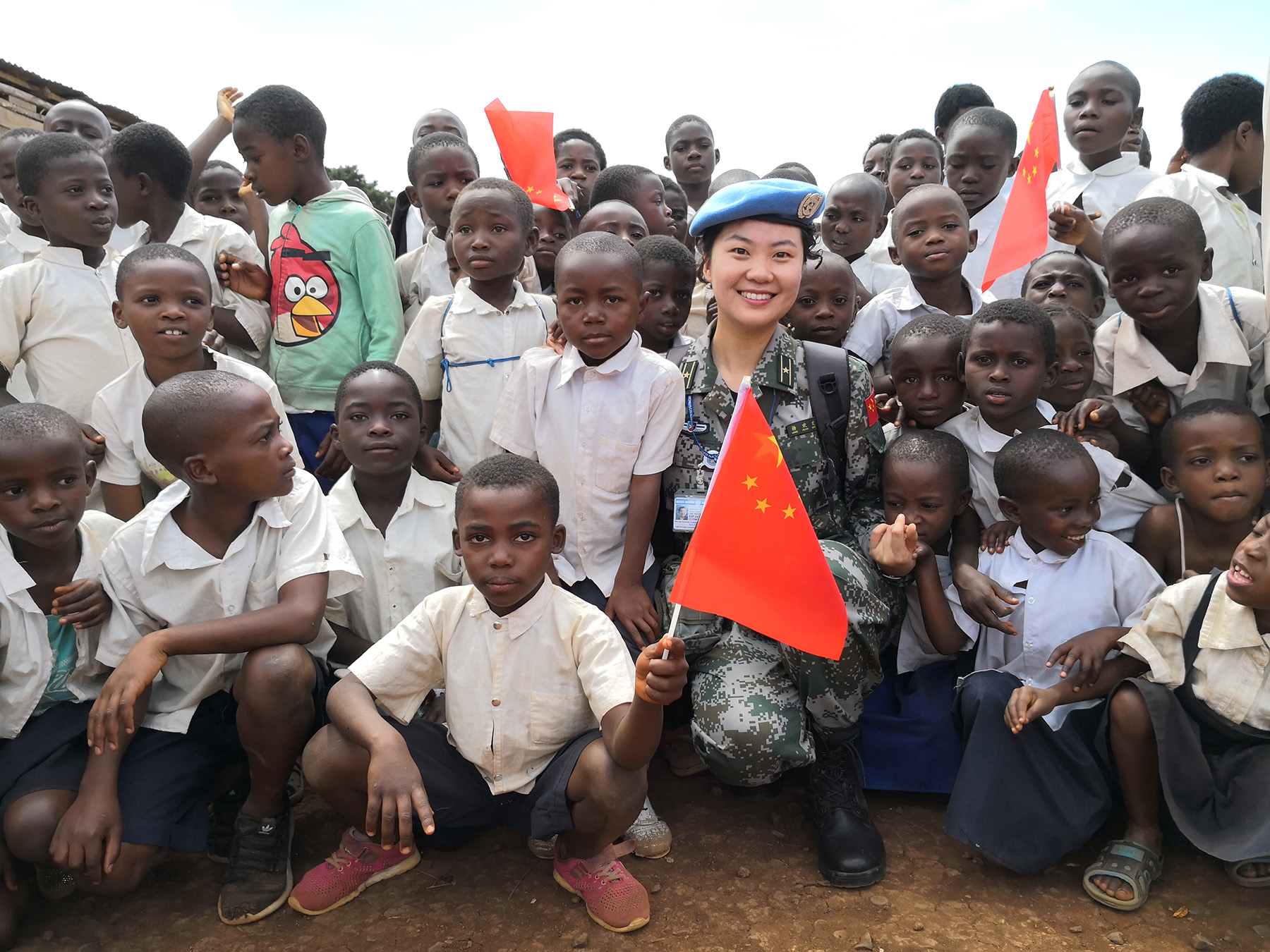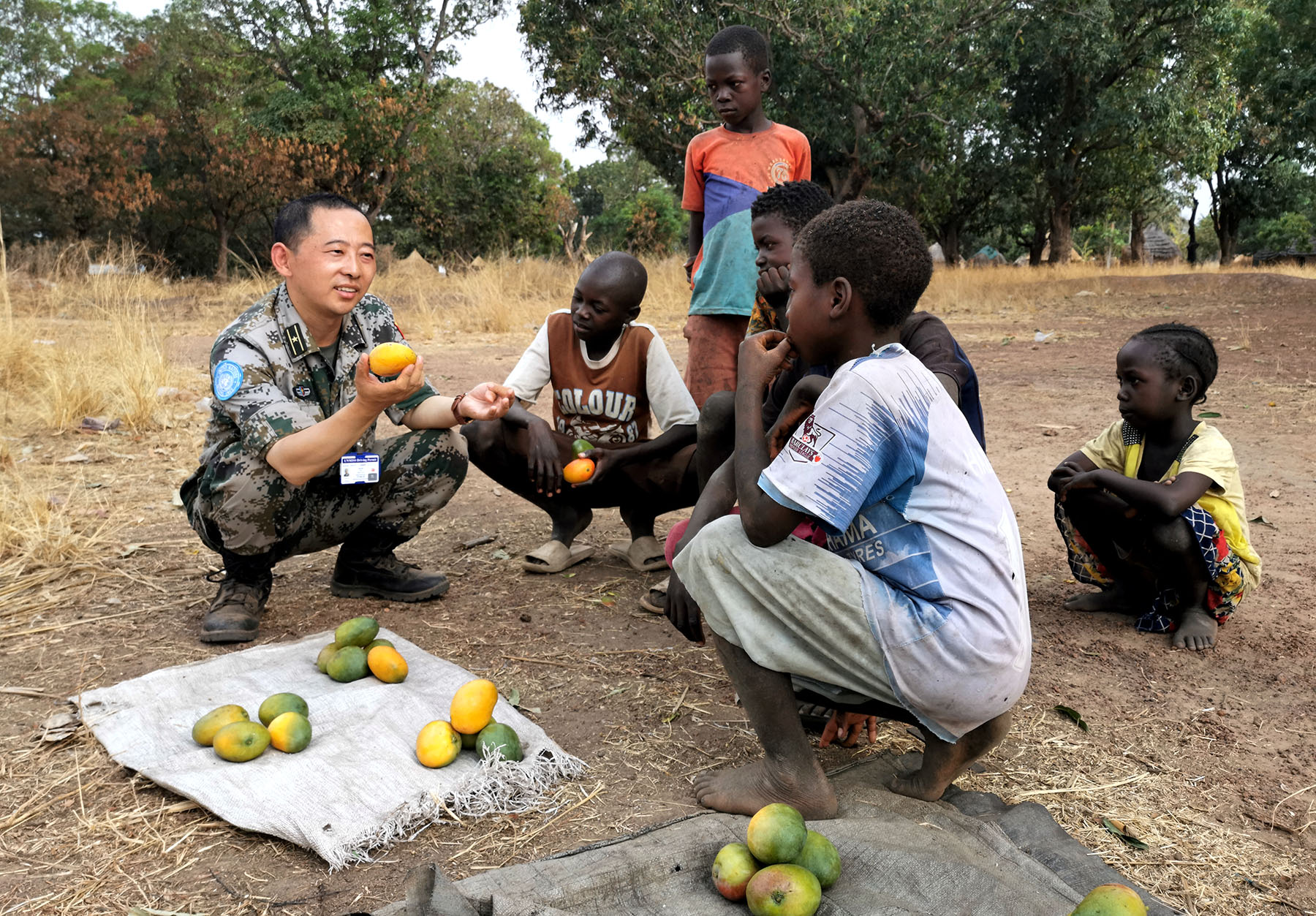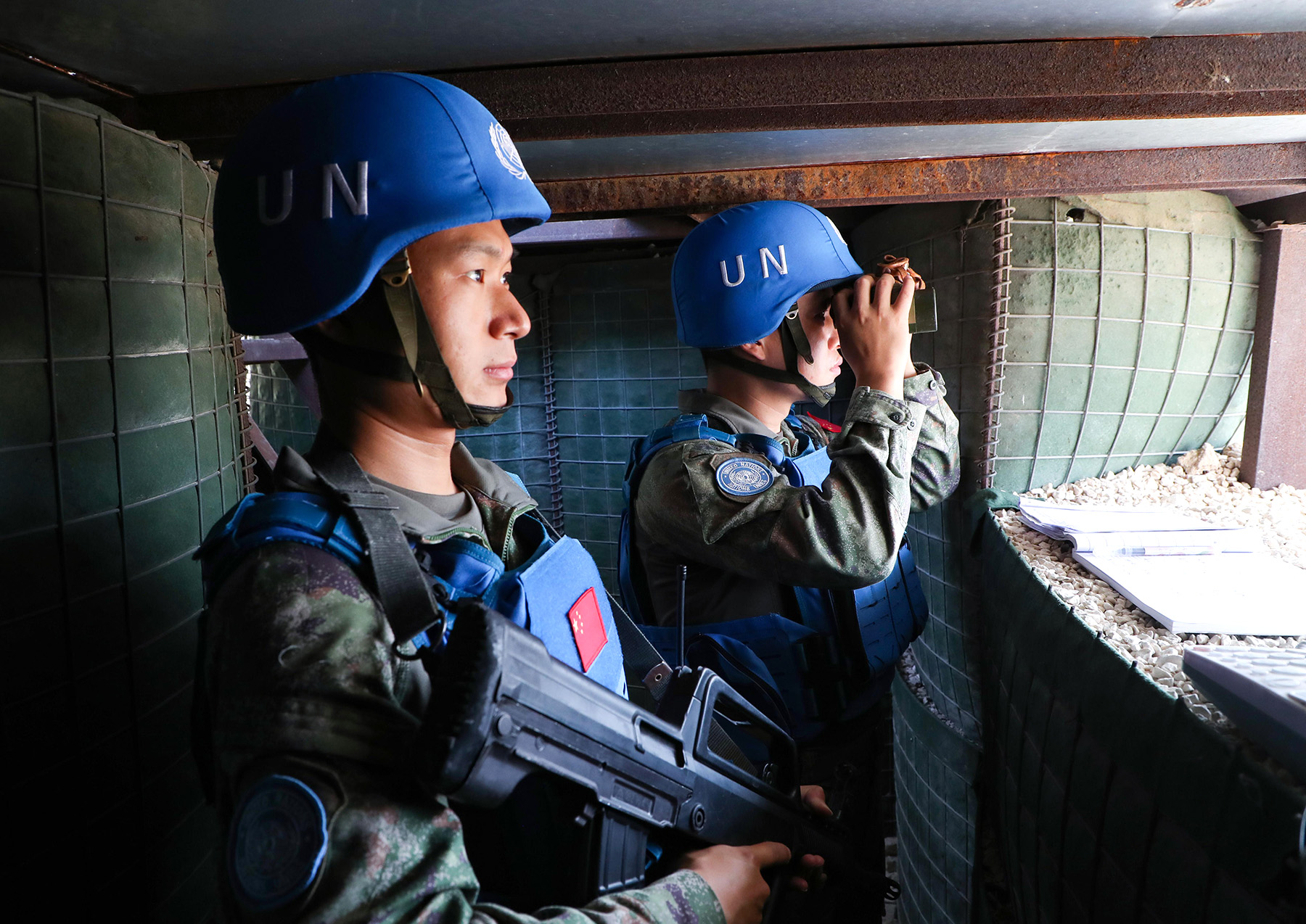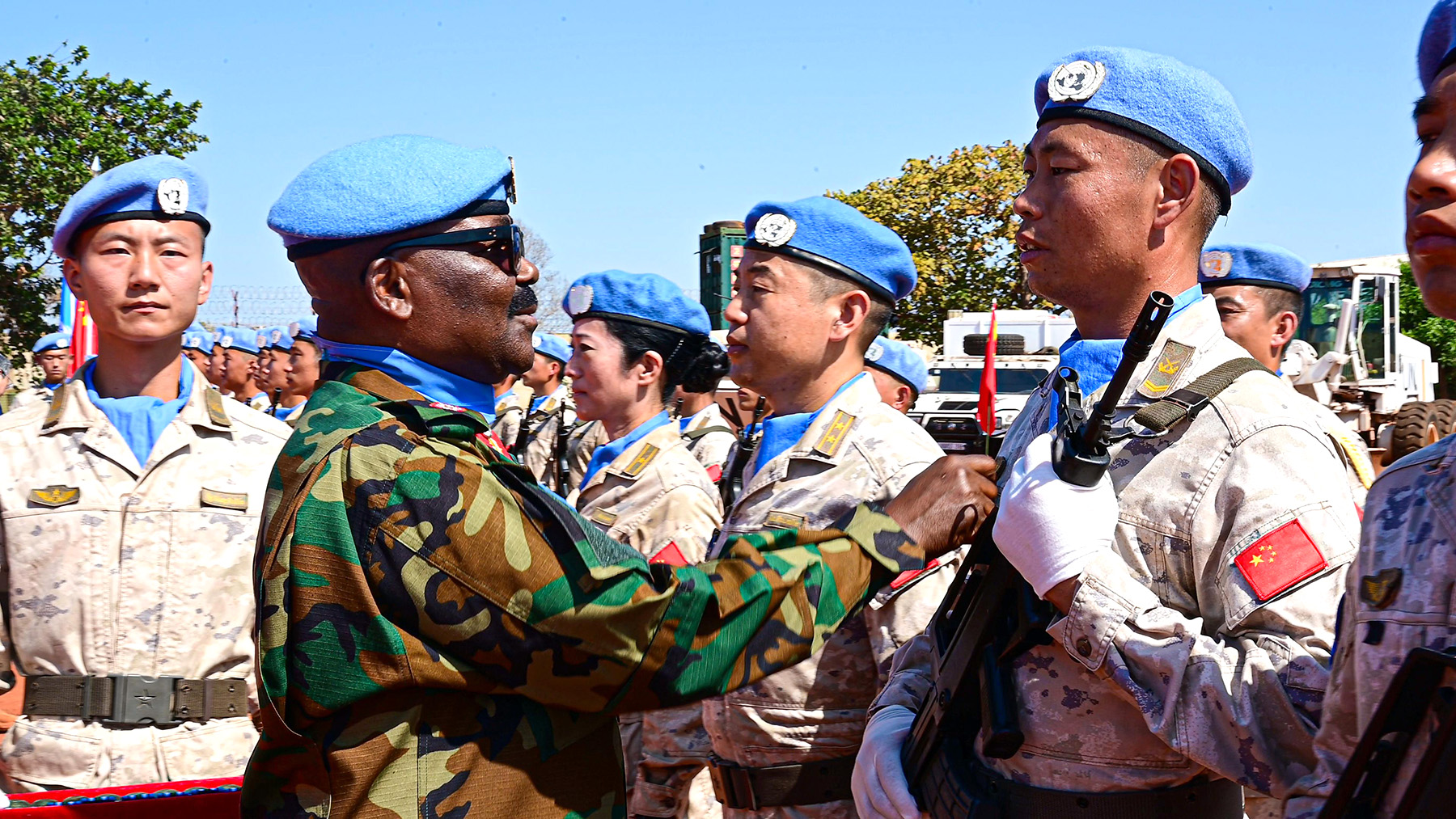Chinese peacekeepers join parade, mark major contributions to UN missions

Chinese peacekeeper Yang Huanhuan will never forget the note she left for a mother in the Democratic Republic of Congo written in Swahili: "Florence, don't cry, be strong! We stand with you!"
Yang served as a military observer in the United Nations Organization Stabilization Mission in DR Congo from 2018 to 2019. She was also among the first female military observers sent by China.
During her frequent patrols, she met Florence, a single mother of three children, whose house had been destroyed in a fire.
Florence's plight deeply saddened Yang, so she gave her $50 along with the note, placed in an envelope. She also gave the mother clothes and shoes, in the hope of cheering her up.
"The $50 was the equivalent of Florence's monthly salary," said Yang, who is now a PhD student on the Nanjing campus of the National University of Defense Technology.
READ MORE: PLA plays major role as global peacekeeper
To Yang's relief, Florence, who had no mobile phone and couldn't speak English, managed to send a message through someone, saying that she had rebuilt her home to start a new life and would never forget the help of the Chinese military observer. The story was featured in an article published on the UN's peacekeeping website.
Like Yang, Wu Feng, 42, an instructor at the Shijiazhuang campus of the Army Engineering University of the People's Liberation Army, also had unforgettable experiences as a military observer with a UN Mission in South Sudan from 2019 to 2020.
"As a peacekeeper, the role of a military observer is often romanticized by the public. But in reality, the work is full of thrills and challenges," he said, noting that UN missions set high standards for military observers.
"The main duties of military observers include observation, investigation, verification, liaison and reporting, and they also assist NGOs in humanitarian aid," he said.
During missions, observers must strictly adhere to impartiality, carry no weapons and operate independently, not as part of any peacekeeping unit, he added.
"Observers are both faithful recorders of conflicts and crucial promoters of peace processes," Wu said while pointing out an observer's work is highly demanding, requiring 24/7 readiness and vigilance.
His observer team conducted daily patrols in Wau, South Sudan, with two to four short-duration patrols every week covering 50 to 200 kilometers, and two to three long-duration patrols monthly, lasting six to seven days with field camping.
Observers also undertook monthly helicopter patrols, two to four convoy escort missions and accompanied engineering units for road surveys, he said.

Key force in missions
In South Sudan, Wu witnessed the Chinese peacekeeping engineering detachment constructing the Sopo Bridge, reinforcing his belief that Chinese peacekeepers have become a key force in UN missions through their expertise.
In April 2020, the detachment set out from their camp, braving the risks of COVID-19 infection and the scorching heat, to reach the Sopo River, 254 kilometers away. The journey took three days.
"Upon arrival, the engineering unit immediately began work, digging up silt, laying foundations and installing culverts. After 20 days of relentless effort, the 68-meter-long and 8-meter-wide bridge was completed," Wu said.
The bridge became a crucial link for the Raja region, greatly helping locals and supporting UN humanitarian efforts, he said.
"The secret to Chinese peacekeepers becoming a key force lies in three words: professionalism, dedication and sacrifice," the former peacekeeper said, stressing that Chinese peacekeepers confidently build trust with sincerity and strength.
Given the harsh local living conditions and complex political situations, Chinese peacekeepers realize the preciousness of peace, and make contributions to improve local people's lives in their own ways.
"Coming from the world's largest developing country to the war-torn DR Congo presented obvious challenges," said Yang, who noted that "as a soldier, I am prepared for all kinds of hardships".
In her mission areas, there was no safe drinking water — or even water for washing. "We had to go 5 km away to get it," she said.
A question she often asked herself was: "How can the villagers be actually lifted from poverty to prosperity?"
For Yang, the answer was clear — knowledge can change the course of people's lives.
She stopped taking candies and biscuits to local children when patrolling, and started bringing books, notebooks, pens and soccer balls, hoping to spark their interest in learning.
"Knowledge can indeed change a person's fate, and sports can make one feel stronger and sturdier," Yang told the local children. "I could tell from their faces. They were more curious, with a longing for happiness," she said.
As military observers, Yang and her peers compiled the firsthand information gathered during their patrols, and reported it to relevant departments daily. "It makes me proud to see how our efforts can help make some difference in the country," she said.

Landmark anniversary
This year marks the 80th anniversary of the victory in the Chinese People's War of Resistance Against Japanese Aggression (1931-45) and the World Anti-Fascist War, and is also the 35th anniversary of China's participation in UN peacekeeping operations.
In 1990, China first took part in UN peacekeeping operations by sending five military observers to Egypt and Syria for missions organized by the UN Truce Supervision Organization, which is headquartered in Jerusalem.
Since then, the Chinese military has sent over 50,000 personnel to participate in UN peacekeeping operations in more than 20 countries and regions, including the DR Congo, Lebanon, and South Sudan, according to the Ministry of National Defense. A total of 17 Chinese peacekeepers have paid the ultimate price on these missions.
China is currently the second-largest contributor to the UN peacekeeping budget. Among the five permanent members of the UN Security Council, it is the top contributor of peacekeepers, with nearly 2,000 Chinese troops serving in six peacekeeping missions.
At the UN peacekeeping summit in 2015, President Xi Jinping announced six measures that China would take to support these operations. All six measures have been fully implemented, including establishing a standby peacekeeping force of 8,000 troops, offering 20 training programs to over 1,500 peacekeepers from more than 60 countries, and sending 25 rotations of engineering and medical units, totaling about 7,000 troops, to missions in Africa and Asia.
Atia Ali Kazmi, director for Global and Regional Studies at the Institute for Strategic Studies, Research and Analysis in Pakistan, said that the PLA brings several distinct advantages to UN peacekeeping. Its logistics strength, rapid deployment capabilities and disciplined force structure make the PLA an efficient contributor and operator in complex environments, she added.
"China's principled commitment to sovereignty, noninterference, and multilateralism lends credibility and balance to UN operations, especially in politically sensitive missions," she said.
The PLA's growing investment in medical, engineering, and explosives-handling support, further enhances its peacekeeping value compared with traditional Western contributors, she added.

Joining parade
On Wednesday, China's peacekeepers will take part in the grand military parade in Beijing to commemorate the 80th anniversary of the victory in the war against Japanese aggression and fascism.
It marks the second time Chinese peacekeepers have participated in such a grand parade. In 2019, they joined the parade to commemorate the 70th anniversary of the founding of the People's Republic of China.
Wu Zeke, deputy director of the Office of the Leading Group for the Military Parade and a senior officer of the Joint Staff Department of the Central Military Commission, said at a briefing in August that all the participating peacekeepers had undertaken international peacekeeping missions and come from engineering and infantry units.
"This arrangement not only highlights the solemn commemoration of the victory, but also demonstrates our commitment to fulfilling international obligations and maintaining world peace," he said.
Over the past 35 years, Chinese peacekeeping forces have gradually moved toward a scientific and institutionalized path, forming principles, policies, and action guidelines with Chinese characteristics that meet international standards, Wu said.
Chinese peacekeeping forces have expanded from a single service branch to multiple military branches, transitioned from support and security tasks to comprehensive multifunctional roles, and extended their mission objectives from ceasefire monitoring to lasting peace, making significant contributions to world peace, he said.
ALSO READ: UN peacekeeping chief stresses China's key role
China's military has demonstrated its steadfast support for multilateralism and the purposes and principles of the UN Charter through practical actions, according to Wu.
Zhang Junshe, a former researcher at the PLA Naval Research Academy, said that maintaining world peace is the duty of China as a major responsible country.
"At the same time, the stronger China becomes, the more public security products the Chinese military can provide to the international community," he said. "Therefore, the growth of China's military power is increasing the force for maintaining peace in the world, and is not a threat."
Since 2015, the MND's Peacekeeping Affairs Center has conducted 25 international training programs, training more than 1,600 peacekeepers from over 70 countries, ministry spokesman Zhang Xiaogang said in a news briefing in July.
Li Wei contributed to this story.
Contact the writers at jiangchenglong@chinadaily.com.cn


